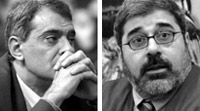It’s clear that having an open border is good for economic development. Although it may be a surprise to many, these are the words of Armenian National Committee correspondent and chief of the Political Affairs Department of the ARF Bureau Kiro Manoyan.
According to him, Armenia has to be ready for the possible economic reforms. He also doesn’t exclude that Turkey may open its borders for certain political motives and without the resolution of any issues.
“ Turkey needs Armenia to be a weak country. I’m almost certain that if the Armenian authorities approve Turkey ’s preconditions, Turkey will bring up new reasons in order to try to close the borders and make Armenia weaker,” said K. Manoyan during a press conference on Monday.
Armenian National Movement board member David Shahnazaryan remarked the current Armenian authorities unfortunately don’t have the opportunity to lead politics favoring Armenia ’s internal and foreign policies.
“The fact that the opening of the Armenian-Turkish border is beneficial for Armenian economy is non-negotiable. Of course, there have to be some compromises, but not in the issue of the Armenian Genocide denial. It’s simply absurd to talk about Armenia denying the Armenian Genocide. That’s also non-negotiable. But once again, we are certain that international recognition of the Armenian Genocide is not the number one goal of Armenia’s foreign policy,” said D. Shahnazaryan. According to him, Armenia ’s foreign policy is isolating the country and Armenia is turning into, as he called it, the “white fox” of the region. Shahnzaryan says that the Armenian government is less independent than Azerbaijan , Georgia and even Belarus .
“We have the Genocide issue, but it’s wrong to tie the present and future of Armenia for the sake of that, in this case international recognition,” says the ANM board member.
K. Manoyan stated that until 1998, the Armenian-Turkish border was closed and the international recognition of the Armenian Genocide was not even on Armenia ’s foreign policy agenda.
“So, Turkey had the same role on that back when the Genocide recognition issue wasn’t on the foreign policy agenda. The recognition of the Armenian Genocide is not the reason that Turkey blockaded Armenia ,” said K. Manoyan.
“Thank God you said that it would be better if Turkey opens its borders. That means that your party no longer looks at that as a front. Do you know how much those preconditions have changed as a result of your politics? Before 1998, Turkey told Armenians to vacate 2-3 villages, give us room for “face saving” and we’ll open the border,” said D. Shahnazaryan, adding that at the time, the Armenian authorities didn’t take that step because that was going to lead to the hardening of Azerbaijan’s role on the issue: Azerbaijan was going to want 2-3 regions if Armenia gave 2-3 villages just like that…
“There are more preconditions as a result of the ARF policy. Now we have the total resolution of the Nagorno-Karabakh conflict, dislocation of all the forces in the territories, including Nagorno-Karabakh… Mr. Manoyan is correct; if the Armenian authorities approve these preconditions, Turkey will come up with new preconditions because while all of this is going on, Armenia’s status has weakened and your party has turned Armenia into an attaché to Russia’s foreign policy,” said Shahnazaryan to Manoyan and added: “Today, Turkey is very far from EU standards. Despite that, your fellow Armenians feel much safer in Turkey than in Russia , your strategic ally country.”
According to David Shahnazaryan, due to the foreign policy, Armenia has been left without a U.S. Ambassador for months and this does not benefit Armenia . David Shahnazaryan advises the Senator blocking the nomination of the candidate for the post of U.S. Ambassador to Armenia to not set such demands on the Ambassador to be sent to Armenia , but rather the Ambassador to be sent to Turkey . Manoyan considers the appointing of the ambassador as part of U.S. internal affairs and adds that “our” intervention would mean the intervention in U.S. internal affairs. The leader in the campaign against the appointing of Richard Hoagland for the post of Ambassador to Armenia is the ANCA commission which, according to Manoyan, can’t be confused with the ARF.
“The ARF and the ANCA commission aren’t the same,” assured the correspondent of the ANCA office.
In reference to the Nagorno-Karabakh conflict, D. Shahnazaryan said that although the 1997 phased version of the Nagorno-Karabakh conflict resolution is currently on the table of negotiations, however now there is a new element -the referendum, which Shahnazaryan considers as positive.
“The rest is simply the repetition of the 1997 version and we are in favor of that,” said Shahnazaryan.
Manoyan had this to say: “We’re not in favor of that. The authorities are.”
According to the ANM administration staff, the Armenian and Azerbaijani authorities put one issue on the table and say something else to the presses.
“Their goal is to prolong the negotiations,” said Shahnazaryan and, in response to this, Manoyan asked: “Are they always going to be the ones doing that? Aren’t there going to be elections?
“They’re going to be elections in Armenia ? I’m hearing it from you for the first time,” replied D. Shahnazaryan.
P.S. “You know what, Mr. Manoyan? You have always been afraid of taking responsibility. Doesn’t your party take responsibility for the Genocide? Your political allies, the Young Turks perpetrated the Armenian Genocide and your party was the political power of the time expressing the viewpoints of the Armenian people. Don’t you want to take on the responsibility? Don’t you want to evaluate that? You must give that evaluation, right?” Mr. Manoyan left these questions unanswered during the press conference.

